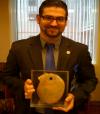Had Tachycardia. Had Successful Catheter Ablation. Again Had Tachycardia. Normal?

At the Emergency Room the cardiologist said the surgery is only 50% success rate and was not good at explaining why he would still be having tachycardia. Is this normal? How does one know if the operation was a success? Where do we go from here. He is very upset by this turn of events and especially by the fact that no one told us to expect the tachycardia to persist.
thanks for your concerns
1) after ablation there is a degree of inflammation that can increase the reactivity of the electric tissues leading to early recurrence of tachycardia; however it is of utmost importance for the treating EP doctor to know about what happenned and see if it was the same type of tachycardia or another type; for example atrial fibrillation is common and does not respond to vagal maneuvers
2) usually a period of at least 4 weeks is needed for complete healing of the tissues.
3) the next step if there is recurrence of the same tachycardia that was ablated after 4 weeks is to consider another ablation; ablation procedures are not perfect and can fail the first time
best regards
Dr Brenes Salazar MD
Cardiology
Mayo Clinic MN
Answered by

Get personalised answers from verified doctor in minutes across 80+ specialties



